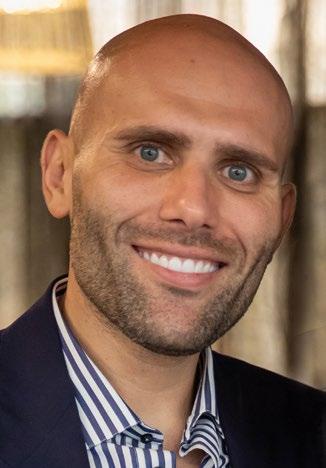
2 minute read
Bringing progressive microsurgery to Australian hospitals
Dr Bish Soliman, a Sydney-based plastic and reconstructive surgeon, used the Morgan Travelling Fellowship to advance his knowledge of microsurgery in Canada.
Dr Soliman chose the Morgan Travelling Fellowship because it fitted his needs professionally and, from a personal standpoint, his young family wanted to explore Canada. He came back with new surgical skills and refined techniques to share with colleagues and Trainees, so they can benefit from advanced, efficient microsurgical practices.
Advertisement
He spent the first six months of his fellowship involved in state-of-theart microsurgery at the University of Manitoba in Winnipeg. He participated in more than 150 cases of microsurgical reconstruction, mostly of the breast, head and neck, and lower limb.
During his time in Manitoba, Dr Soliman learned advanced surgical and flap techniques that aren’t yet widely used in Australia but, more importantly, he discovered how to be highly efficient in microsurgery. Now, he shares these skills with his surgical units at home, where patients can benefit from a broader range of reconstructive options.
Dr Soliman also learned new techniques in free flap planning with 3D printing. This is invaluable in head and neck reconstruction and facial trauma, as surgeons can plan their reconstruction before surgery. This takes the stress out of the procedure and reduces operating time.
He also noted that using the same welltrained team, set up and equipment for all flap cases reduces variability and helps with efficiency.
Dr Soliman saw how useful Enhanced Recovery After Surgery (ERAS) protocols can be. These multimodal perioperative care pathways are designed to solve problems that may delay recovery and, ultimately, discharge (for example, pre-op nutritional support, post-op early mobility, pain management and bowel function). ERAS protocols lead to improved outcomes and greater patient satisfaction.
Dr Soliman spent his second six months in Kelowna, British Colombia, where he enhanced his skills in aesthetic reconstructive surgery. Participating in 250 cases, he learned new techniques in the art of breast shaping and preoperative planning for aesthetic and reconstructive breast surgery.
Dr Soliman also realised the true value of teamwork and the importance of good communication. Grateful for his experiences, Dr Soliman gave back to the system by getting involved in the resident training program. He gave talks on burns management and ran pre-exam slide sessions.
Since returning to Australia, Dr Soliman has begun two consultant microsurgery positions in Sydney tertiary referral centres. He’s implementing the knowledge he learned abroad and hopes to bring more efficiency to free flap planning and execution. He also plans to set up a free flap database for research and teaching purposes, and would like to teach his microsurgical techniques to registrars.
Dr Soliman feels very grateful to have worked alongside world-class surgeons through his fellowship. He hopes more surgeons will seek out a scholarship to go abroad and return with enhanced skills, so New Zealand and Australian surgeons can share knowledge and strengthen the future of surgery in our corner of the world.






